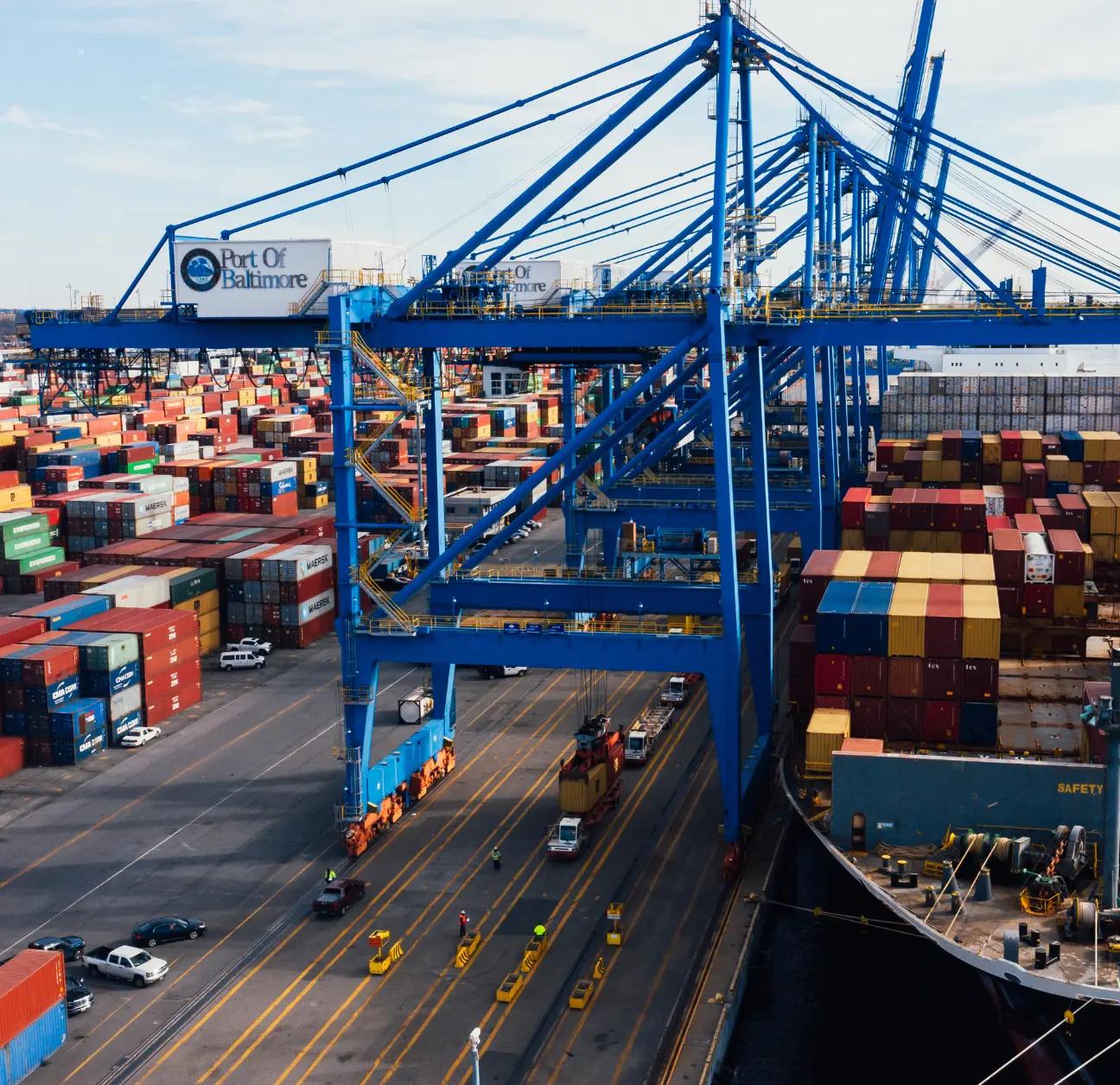Supply chain management and transportation management systems run the gamut from1980s-era systems to modern cloud platforms. Chain.io was built to integrate your TMS to any platform, regardless of the era it was built in, with ease.
Modern supply chains don’t operate in neat, tidy boxes. They’re sprawling, interconnected, and constantly in motion. That means your data is, too.
Between shippers, freight forwarders, suppliers, and systems—everything from TMS platforms to carbon reporting tools—there’s a constant stream of information that needs to move smoothly, quickly, and accurately.
Too many companies still rely on brittle custom code or clunky workarounds to make this happen. That’s not just inefficient; it’s risky. Disconnected systems, delayed updates, and manual handoffs slow down operations, increase costs, and hurt your ability to make smart decisions.
That’s why choosing the right supply chain integration software isn’t optional anymore. It’s fundamental.
The right solution doesn’t just connect systems. It becomes the backbone of your supply chain planning, compliance, and logistics performance.
If you’re evaluating your next integration partner, here’s what actually matters—and what to look for.
Why choosing the right integration software matters
This isn’t just an IT decision. It’s a business-critical one and helps every team make informed decisions across the entire process.
Every team in your organization—from supply chain logistics to sustainability, finance to compliance—relies on clean, accurate data to do their jobs. Integration isn’t just a technical priority—it’s a strategic one.
But if your data is stuck in PDFs, arrives hours late, or needs to be manually formatted before anyone can use it, you're flying blind.
Strong supply chain integration software bridges those gaps in your supply chain management, helping teams work from a shared set of accurate, timely data. It connects your internal systems, external trading partners, and third-party platforms so everyone’s working from the same source of truth.
That translates directly into operational efficiency, faster decision-making, and fewer missed opportunities across your supply chain operations. It also improves inventory management by ensuring your stock levels reflect real-time movement and updates.
Core capabilities to prioritize in integration software
A solid integration platform needs to do more than just move data around. It should actually make your operations better. Clean and timely supply chain transactions are the foundation for smart logistics decisions and customer satisfaction.
These are the features that matter most.
Pre-built, logistics-specific connectors
When you onboard a new system, you shouldn’t have to start from scratch. Look for a platform that offers pre-built connectors to commonly used tools, such as TMS, CO2 reporting platforms, real-time visibility tools, supplier collaboration platforms, and others in your network.
Pre-built adapters make it easy to spin up connections without months of custom development. They also reduce errors since the mappings and logic are already battle-tested.
For example, Chain.io’s supply chain integration software comes with a library of ready-made connectors tailored to the needs of modern supply chains.
Support for A2A and B2B integrations
Many platforms force you to choose—either connect internal apps (application-to-application or A2A) or link to partners (business-to-business or B2B). You shouldn’t have to pick.
Your platform should handle both.
That means you can connect your ERP, WMS, and TMS systems internally while also sharing data externally with freight forwarders, customs brokers, and vendors. That flexibility is essential for scaling across a complex global supply chain.
Automated data transformation and mapping
File formats differ, and field names change. Some systems still speak EDI, while others need JSON. Your integration platform should handle those differences without you lifting a finger.
Automated data transformation and mapping ensure consistency and accuracy, even when dealing with legacy formats or new systems. This makes your operational data clean, standardized, and usable, making your business processes consistent and error-free.
Scalability and flexibility
Supply chains aren’t static. You’ll add new vendors, onboard new tools, and expand to new regions. Your integration software should grow with you.
Look for a platform that lets you easily scale without rebuilding the entire setup. This is where a resilient supply chain starts—with systems that can flex and scale without creating unnecessary complexity.
Compliance and audit support
Customs. Sustainability. Trade regulations. You’re constantly juggling requirements—and the fines for getting it wrong aren’t small.
Good integration software makes compliance easier. It should support secure, traceable data flows, ensure complete audit logs, and help you meet reporting obligations without digging through emails or reconstructing timelines. This level of traceability also supports your sustainable operations strategy by aligning compliance with environmental goals.
If you’re tracking CO2 emissions or working toward a sustainable supply chain, your platform should support and simplify those data flows.
For more on how this works in practice, check out Chain.io’s insights on the importance of supply chain integration.
Features that make life easier
The core features are essential but don’t overlook the extras—especially if your team isn’t made up of developers. For example, data integrations will help you automate core processes, improve supply chain visibility, and ensure critical updates reach the right systems.
These “nice-to-haves” can save hours of work and reduce support tickets:
- Low-code or no-code setup: Let analysts or ops folks configure workflows without engineering help.
- Visual data flow tools: These make troubleshooting easier when something breaks or data looks off.
- Strong customer support: Onboarding is smoother when there’s a team that actually knows the supply chain.
- Ecosystem of partners: The more systems already connected to your platform, the faster your integrations go.
- Efficient collaboration: Connect with your internal teams and trading partners without relying on manual back-and-forth.
These tools make integrations more sustainable and less dependent on specialized resources—helping your team stay agile even when internal bandwidth is tight.
Common mistakes to avoid
There is no shortage of software platforms that claim to integrate, but picking the wrong one can set you back months.
Here are the traps to avoid:
- Choosing a generic iPaaS: Tools like these weren’t built for logistics. They lack the pre-built adapters, domain expertise, and support to make sense of supply chain data.
- Building it all in-house: DIY might initially seem cost-effective, but maintaining those custom connections drains resources fast.
- Overemphasizing features over outcomes: Don’t get distracted by dashboards. Focus on whether the platform solves real business problems like delayed shipments, invoice errors, or manual data entry.
You don’t need a shiny new tool. You need one that actually works.
Why Chain.io stands apart
Chain.io was built specifically for supply chain integration. It’s not a catch-all platform or a tool trying to force logistics into a generic framework, and that shows up in the details.
Here are just a few benefits:
- Logistics-first: Deep experience with systems like TMS, ERP, and customs tools.
- A2A and B2B integrations: Built to handle both internal systems and external partners.
- Largest network of pre-built supply chain connectors: Faster time to value.
- Automated data mapping: Clean, standardized data with minimal manual work.
- Invisible when it works: Once live, it runs in the background so your team can focus on what matters.
If you’re looking for an integration platform that’s purpose-built for modern supply chains, Chain.io’s supply chain technology is a solid place to start.
Set your supply chain up for success
Your systems will never all come from one vendor, and your partners will always use different tools. That’s just the nature of a global supply chain.
But with the right integration software, that doesn’t have to slow you down.
By investing in a platform built specifically for supply chain solutions, you can replace manual processes and move faster.
If you’re ready to make your supply chain processes more efficient, scalable, and resilient, now’s the time to rethink how your systems connect.
Explore Chain.io’s supply chain integration strategies or book a demo to see what’s possible.
Book a Demo7 Tips for Successful Integrations






